
23-02-2026 11:22
Thomas Læssøehttps://svampe.databasen.org/observations/10584971

29-11-2024 21:47
Yanick BOULANGERBonjourJ'avais un deuxième échantillon moins mat

07-02-2023 22:28
Ethan CrensonHello friends, On Sunday, in the southern part of

19-02-2026 17:49
Salvador Emilio JoseHola buenas tardes!! Necesito ayuda para la ident

19-02-2026 13:50
Margot en Geert VullingsWe found this collection on deciduous wood on 7-2-

16-02-2026 21:25
 Andreas Millinger
Andreas Millinger
Good evening,failed to find an idea for this fungu

08-12-2025 17:37
 Lothar Krieglsteiner
Lothar Krieglsteiner
20.6.25, on branch of Abies infected and thickened

Bonjour à tous,
Voici une récolte d'hélotiale sur feuilles de bouleau en zone de tourbière pour laquelle je ne trouve pas d'identité. Merci de vos remarques.
Here is an ombrophiloid helotiale collection on Betula leaves in peat-bogs . Any help will be appreciated
Apos : up to 0.5 cm, nearly translucent white at first , then greyish , rather fleshy , wrapped in a gelatinous gangue at first.
Ascus 105-115 (125) x 9-10,5, IKI -, H+, Spores 9,5-11,5 (13) x 4,5-5
Paraphyses x 2µm with few small VBs
No cristals seen
Ombrophila translucent would suit the substrate but doesn't match several major caracters such as IKI negative reaction.
Amitiés. Michel

I don't have an idea... "Mollisia" spectabilis seems excluded too.
Zotto

Bien que la longueur sporale moins longue, ta collection doit être proche des récoltes citées sur ce même forum à ce lien
http://www.ascofrance.fr/search_forum/19272
Amitiés, Guy
Je viens de faire une recherche dans la révision des British Helotiaceae de Dennis et je trouve page 164 dans le texte concernant Ombrophila obstricta mention de O. umbonata (Pers.) Karst. avec des spores de la dimension qui correspondent 7-12 x 3-5 µm
Ombrophila umbonata (Pers.) P. Karst., Bidr. Känn. Finl. Nat. Folk 19: 89 (1871) f. umbonata, dont le nom actuel serait Niptera umbonata (Pers.) Fuckel, Jb. nassau. Ver. Naturk. 23-24: 292 (1870) [1869-70] (Index Fungorum)
Je viens de trouver ceci: http://ascofrance.fr/forum/24425/une-idee
Pezoloma ou Ombrophila obstricta
Amitiés
Brigitte

I am not sure if Michel's apothecia have that thick external gel layer of thin hyphae on the excipulum? O your section, Michel., I am not sure. it should be obvious, at least at the lower flanks.
Zotto

Quel magnifique forum que cet Ascofrance ! Merci à chacun d'entre vous pour vos réponses
My fungus was collected at 30 km from Jean Louis Jalla's collecting site(http://ascofrance.fr/forum/24425/une-idee) and on the very same substrate (I found it in two sites actually and each time on Betula leaves ). It is noticeable that I also found larger spores in more mature apos (11-13 µm long versus 9,5-10,5 in others and both ''types'' with free (thus mature) spores measurements)
Yes Zotto, as seen on macro pics, a gel sheath wrapps the fresh apos , it leaves a thin membrane also on the hymenium , coloured in CRB . I admit it's not so readable on the section pic .
AMitiés Michel

So when this fungus might be restricted to Betula leaves then I am sure the following sample by Ruben Martinez Gil is also the same:
http://www.ascofrance.fr/forum?page=136
Spores of 10.5 to 13.5 x 4.5-5.5 microns fit very well, and his images show that they may but must nt contain a bigger drop at each end.
I would very much like you to send a portion of this sample for sequencing to Danny Haelewaters in Massachusetts. He might presently be on holidays as I got no response in another matter. I will tell you when he is back.
Zotto

Yes Zotto, good idea.
Ruben's post on Ascofrance is http://www.ascofrance.fr/search_forum/29832
It would also be useful to compare with Enrique's find which I think different (spores much longer and differently shaped ) and Guy Garcia's which I think closer .
Amitiés
Michel

Guy Garcia's find on soil with rootlets (VII.2012) has spores with the bigger oil drops away from the poles, perhaps this has some meaning. Also spores are larger.
Enrique's sample Pezoloma, 20.VII.2012-1.jpg has much too long spores.

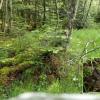


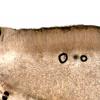
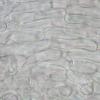
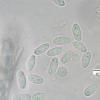
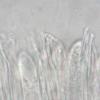


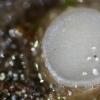
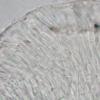
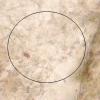
 Hymenium-in-CRB-0001.jpg
Hymenium-in-CRB-0001.jpg